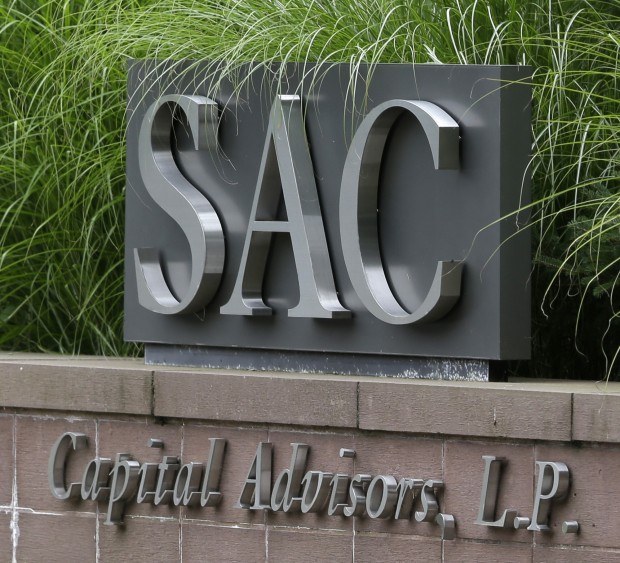Billionaire investor Steven A. Cohen’s hedge fund pleaded not guilty on Friday to insider trading charges in federal court, as questions also surfaced about the future of SAC Capital’s Bermuda-based reinsurance unit, SAC Re.
Ratings company, A.M. Best Co., and the Bermuda Monetary Authority, which regulates insurers on the island, said they were monitoring developments one day after U.S. prosecutors charged the hedge fund and various affiliates with four criminal counts of securities fraud and one count of wire fraud.
A year ago A.M. Best gave SAC Re a top rating. But if the company were to cut its rating of the unit, which had $567.8 million in assets at the end of 2012, in the wake of criminal charges, people may shy away from doing business with the insurer, industry experts said.
“Buyers of reinsurance from SAC Re will be on the phone with their brokers telling them to move out,” said Andrew Barile, an independent industry consultant. Buyers have plenty of choice in the reinsurance industry, experts said, adding it would be relatively easy to change companies.
Separately, outside investors with the $14 billion hedge fund also expressed some uncertainty about what to do with their money only weeks before an Aug. 16 redemption deadline.
SAC had presided over a culture from 1999 to 2010 where employees flouted the law and were encouraged to tap their personal networks for inside information about publicly traded companies, prosecutors said on Thursday.
The criminal case imperils the future of one of Wall Street’s largest hedge funds and could end Cohen’s career of managing outside money. His average annualized returns of 25 percent beat most of his rivals.
Prosecutors did not file criminal charges against Cohen personally, but the U.S. Securities and Exchange Commission has filed a separate civil case against him for failing to supervise two employees.
The SEC is expected to delay its civil case while the criminal trial proceeds. The U.S. attorney also brought a civil case seeking forfeitures and money laundering penalties from Cohen.
The government’s evidence in the criminal case includes a lot of “court-authorized wiretaps” and “a large number of electronic recordings,” such as emails and instant messages, Antonia Apps, an assistant U.S. attorney who has prosecuted other insider-trading cases, told U.S. District Judge Laura Taylor Swain.
Jonathan Gasthalter, a spokesman for SAC, declined to comment. A representative for SAC Re did not return a call seeking comment.
U.S. Attorney Preet Bharara, who brought the charges, declined to give a specific dollar figure for the amount his office is seeking from SAC. But in court papers, prosecutors contend SAC made “hundreds of millions of dollars” in illegal profits from insider trading, and the penalties they seek could be up to three times the amount of the illegal gains.
SAC sought to assure investors its assets were not frozen and redemptions would continue unhindered. Skittish investors have already withdrawn roughly $4 billion from the firm in the first half of the year.
Blackstone Group, Ironwood Capital and Magnitude Capital all withdrew funds earlier this year. Morgan Stanley, which had client money invested with Cohen also took steps to reduce exposure to SAC in the months leading up to the indictment, according to a person familiar with situation.
Morgan Stanley’s exposure is now minimal. A spokeswoman for the bank declined to comment on whether the bank would seek to redeem its remaining funds in the wake of the criminal charges.
While some investors have been loyal to Cohen, one person, who declined to be named, said the new charges worried him. “The real worry is that the regulators are relentless and their sights are set on Steve and they will not stop at nothing to bring him down.”
Others said they would wait a little longer to make a decision and await for any communication from the fund. If investors submit a redemption request by Aug. 16, they will get half their cash back by the end of September and the remainder by the end of December.
WAITING FOR EVIDENCE
The strength of U.S. prosecutors’ case will become clearer once the evidence they are planning to use is laid out, legal experts said.
“Over the next six months you’ll get a sense for why the DOJ charged the entity and failed to charge any of the high-ranking executives,” said defense lawyer Andrew Wise, a partner at Miller Chevalier.
Several former SAC employees, including Noah Freeman, Jon Horvath, Donald Longueuil and Wesley Wang, have pleaded guilty to charges of criminal insider trading.
Judge Swain set a Sept. 24 court date to discuss evidence.
SAC’s lawyers on Friday included: Ted Wells, Daniel Kramer and Michael Gertzman of Paul, Weiss, Rifkind, Wharton & Garrison; and Martin Klotz and Michael Schachter of Willkie Farr & Gallagher.
The criminal case is U.S. v. SAC Capital Advisors LP et al, U.S. District Court, Southern District of New York, No. 13-cr-00541. The civil case is U.S. v. SAC Capital Advisors LP et al in the same court, No. 13-05182.





















 Beyond Automation: The Emerging Role for Contextual AI in Insurance
Beyond Automation: The Emerging Role for Contextual AI in Insurance  Telematics and Trust: How Usage-Based Insurance Is Transforming Auto Coverage
Telematics and Trust: How Usage-Based Insurance Is Transforming Auto Coverage  Reinsurance Program Could Wipe Out Need for Calif. FAIR Plan: Legal Exec
Reinsurance Program Could Wipe Out Need for Calif. FAIR Plan: Legal Exec  AI Got Beat by Traditional Models in Forecasting NYC’s Blizzard
AI Got Beat by Traditional Models in Forecasting NYC’s Blizzard 





